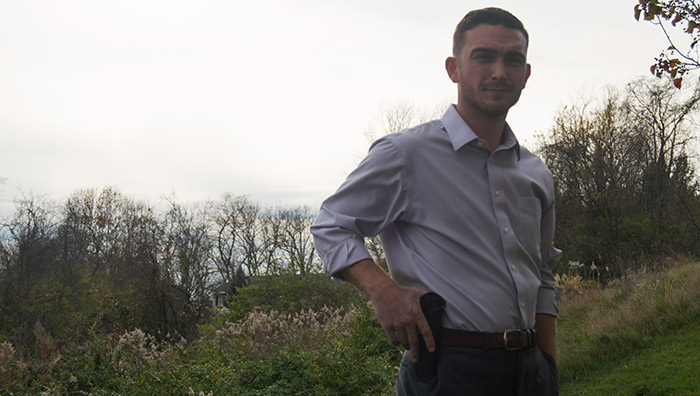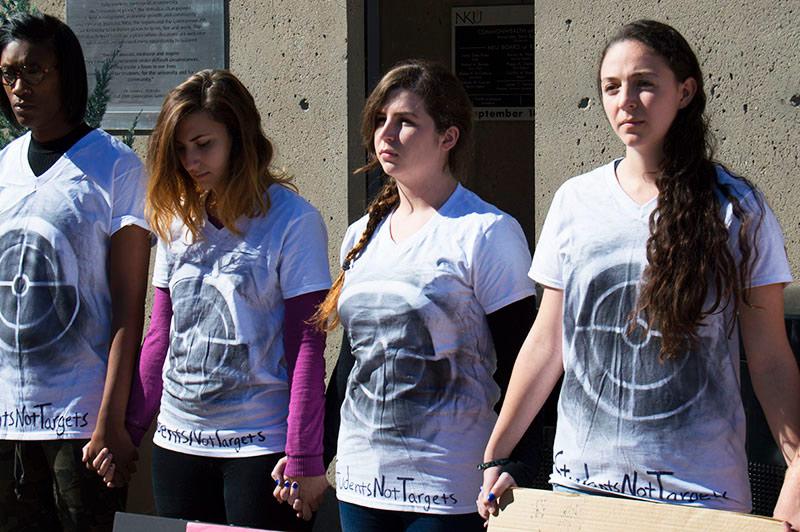 Play video
Play video
He hopes he never has to use it.
But in the case of an emergency, Aaron Hatfield wants to be prepared.
Hatfield, a senator for the Student Government Association at NKU, believes that those who are licensed to carry a concealed weapon should be able to do so, even on a college campus.
Born and raised in Erlanger, Kentucky, Hatfield picked up shooting as a hobby when he was 14. By the time he was a junior in high school, he knew he wanted to join the military.
He enlisted in the Army in 2009, and he was deployed to Iraq two years later. After serving for eight months, Hatfield returned home and enrolled at NKU to pursue a degree in writing studies with a focus in political science.
Hatfield drew attention to the issue when he brought it to the table at a Sept. 14, 2015 student government meeting, nearly a month after an incident in which NKU student Jaylin Johnson allegedly displayed a firearm to another student in Steely Library.
Following the incident, Hatfield said he was approached by several students who were concerned about their safety.

Aaron Hatfield poses with his SCCY 9 millimeter handgun. Hatfield advocates for concealed carry on campus.
“I’ve always been in favor of [concealed carry], and then definitely I think that the incident in the library springboarded it,” Hatfield said.
He added that students expressed that they wanted more research surrounding concealed carry policies on college campuses. As an SGA senator, Hatfield decided to represent those who sought him out.
“If there’s a problem that is necessary for force, I think people should have the right and the ability to protect themselves, and then to protect others that may not be able to protect themselves,” Hatfield said. “I’m not saying guns are the first solution and the first answer to everything, because I just don’t think they are.
“But like I said before, I think it’s like an insurance policy- you hope you never get in a car wreck, but you have car insurance. I hope I never have to use a gun, but if it happens, I’d rather be prepared.”
SGA President Katherine Hahnel said that Hatfield’s views do not necessarily reflect the position of student government.
“Right now, it’s just a research phase,” Hahnel said. “It’s one senator who is bringing it up, so SGA doesn’t have a stance on it. We will take a stance if it becomes a resolution and if we vote on it. Once we vote, then SGA is no longer neutral, and we will take one side or the other.”
NKU President Geoffrey Mearns said that although he and his executive board are interested to hear what student government has to say, there are many steps this policy would have to go through before it is ever presented to the Board of Regents.
“We would need to receive input from not just the Student Government Association, but more broadly from students,” Mearns said. “We would need to receive input from faculty and staff, and other constituents that we represent. We’d have to do our research ourselves to find out what other campuses are doing, and what is the impact on safety from a change or a modification of that kind of policy.”
NKU’s current policy prohibits the possession of a deadly weapon, including firearms, on any property that is owned by the university.
Mearns said that the university’s policy does not permit anyone other than a law enforcement officer to carry a weapon on campus.
Although carrying a concealed weapon on campus is not permitted, university policy does allow individuals with a concealed carry license to store their firearms in the trunk or in a locked compartment of their vehicle.
Kentucky is one of nine states that allow those with concealed carry permits to keep their firearms in locked areas of their vehicles. Other states with this policy include North Dakota, Minnesota, Nebraska, Oklahoma, North Carolina, South Carolina, Georgia and Florida.
Click the states below to view more information on their concealed carry laws.
Since September, Hatfield has been collecting research from a variety of campuses nationwide. Not only has he researched campus policies that allow concealed carry, but he has also looked into universities that do not allow firearms on campus.
“Really what I’ve done is gotten a hold of their student government, to see where their policies stand,” Hatfield said. “We’re working on trying to get both sides and get as much of a broad view as we can. That way, if people want to ask questions, they can come find us.”
Although Hatfield advocates for concealed carry on campus, some students do not see a place for firearms in an educational setting.
Quinn Docter, a senior integrative studies major, decided that she was tired of hearing about violence on social media.
“I got to a point where I needed to do something about it,” Docter said.
“Honestly the minute I think about [concealed carry], I feel sick to my stomach,” Docter said. “This is a place for learning, and to feel comfortable enough to learn, and I feel as though if there were weapons on campus, I could not concentrate.”
- Quinn Docter
With the help of other students, she created the group Students for Social Change, a group dedicated to confronting social injustices and violence.
On Oct. 19, Docter and members of Students for Social Change stood in silence in front of the Student Union. Hand-in-hand, they kept their heads low; their eyes looking down towards the black target spray painted in the center of their white t-shirts.
“Honestly the minute I think about [concealed carry], I feel sick to my stomach,” Docter said. “This is a place for learning, and to feel comfortable enough to learn, and I feel as though if there were weapons on campus, I could not concentrate.”

Quinn Docter (far right) and members of Students for Social Change at an Oct. 19 protest against gun violence. Docter believes that guns do not have a place on campus.
Ron Brookbank, a member of Students for Social Change, agrees that firearms should not be on a college campus. The senior art history major said that there is no reason that calls for a student to have a gun.
“There are some people who have military experience or police academy experience, which would make them able to know how to safely use a gun,” Brookbank said. “But I think that, overall, the majority of people on campus don’t have that ability.”
Hatfield said that although concealed carry will be a major part of his resolution, the overall goal of his resolution is safety, education and research.
“We want to be able to broadly encompass education, safety, awareness, and then of course to push to allow concealed carry,” Hatfield said.
To better gauge the varied opinions and concerns regarding concealed carry, Hatfield plans to issue a survey to the student body in the coming weeks, which will be available online.
“There’s no student climate surveys that have been out yet, there’s no faculty or staff surveys that have been out yet, and that’s something that I would advocate for the powers that be to definitely put out a faculty and staff survey as well,” Hatfield said. “Because I think we need to know. Now it’s being talked about, so let’s see where the students, the faculty and the staff are.”
But for students like Docter, the answer is clear.
“Me, for example, I wish guns never really existed,” Docter said. “But I’m realistic in knowing that not everybody believes that. I think it’s important that we find a middle ground, because there’s no way that we’re gonna [say], ‘Everybody have guns’, and then ‘Nobody have guns,’ we really have to find that middle ground."
“And I don’t know what that answer is, I don’t know what’s going to stop this. I know where I’m comfortable, what I’m willing to compromise. We just need to kind of work together, because we keep fighting each other.”
Back To Home
- About This Project